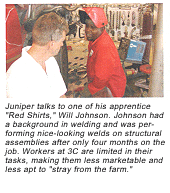n on the facility’s management is often monumental.
Dumbing Down Our Workforce
The expertise required to fix accident-damaged cars has long been the strength of the collision repair profession. It’s a specialty. From the viewpoint of the lay person, there’s still a good deal of magic surrounding the work. But during the ’90s, the industry consolidated and became less of a collection of small shops with skilled artisans and moved toward a larger volume production model.
And because the collision repair process as we’ve come to know it is inherently wasteful, this industry became a perfect target for Detroit-style whiz kids, hell-bent on standardization and process refinement. But when you imagine industrialization with veterans in this business, you’re struck with images of repetitive motion, boredom and a disaffected workforce – hardly what we’d call innovative in today’s business world. Yet this industrial model has long been held out as the future for our industry by such noted business luminaries, one of whom once sketched out a dream for me that exploited all that available low-cost labor in the United States.
Under that plan, all the Dodge Caravans in Cleveland would be directed to a Caravan specialist, whose technicians were skilled in Caravan-only R&R work. In this Caravan shop, picture a low-paid, non-English-speaking worker whose only job is to hang right-side moldings on Caravans – the assumption being that this specialist could do the mind-numbing task in his sleep.
While the Wall Street gang warmed to the prospect of lower labor costs, the plans were embraced by the industry like green tea at a Sturgis bike rally. What the concept lacks in upward mobility it makes up for in pure tedium.
Such scenarios have, for the large part, gone unfulfilled due to the fact that low-end, low-tech workers just weren’t buying. It’s hard enough to find and keep skilled workers in this business when you’re paying top dollar.

With the economy having peaked in the year 2000 and investors spending less today, the prospects for growth in large-scale consolidated operations isn’t good. Between the collapse of some Internet-based businesses (I won’t mention names) and Ford’s divestiture of Collision Team America, the body shop business marked the peak of its heady Wall Street investment days.
Plant Life at 3C
When you market to the masses, you have guaranteed variety whether you want it or not. Juniper says he wants to fix the Fords and the Chevys, but Three C is also getting Chryslers, Audis and Hyundais – everything on the road, including RVs in a separate facility, all ranging in severity. So a cookie cutter method is out of the question.
At Three C, a customer car enters the production plant and goes through a triage, where damaged cars are directed to teams and tasks are simultaneously triggered in the parts and the Pre-Metal/3 Panel Departments. In Pre-Metal, the car is assigned to a repair process manager (RPM), who’s personally responsible for that car from that point forward. There the car goes through disassembly, gets its coding on the windshield, and any repair-and-replace decisions are made. (This is where that discretion comes in.)
The car is then in place in a queue, from which it could go to the frame, heavy metal, light metal, mechanical or prime and blocking departments. The paint department is split into pre-paint and post-paint departments. Each department is staffed by specialists trained in that specific area. There are persons, for example, who just service A/C systems (more on this in a minute).
The organization necessary to run a production facility of specialists is substantial. At Three C, the progression in the organization is Red Shirt, Blue Shirt, Gray Shirt, with graduation in three years in most cases.
While a starting Red Shirt isn’t making enough to support a family of four, he’s building a future in some very real ways. At a time when no career in any sector of the world’s economy seems secure, there’s a lot to be said for fixing cars at the best-equipped and most popular shop in town. Cars will be with us for as long as we live, and the people of Columbus, Ohio, will continue to wreck them. It’s as sure a thing as they come.
What distinguishes the Three C production process from other large-scale operations is how the workers are limited in their tasks. Instead of 30 technicians skilled in all phases of assembly, straightening and welding, the individuals in this plan only specialize in one of those tasks. As I mentioned, there’s a department devoted to A/C service. And that’s all they do.
While an individual can become very proficient at welding in new panels, for example, that person lacks the skill sets to be a valuable member of another shop’s staff, where its technicians lean toward the combo-man approach. In fact, Three C employees are somewhat sequestered from the area workforce, a status that tends to keep them from wandering off the farm. Their skills aren’t as marketable in a smaller shop, where a body tech would be required to know how to straighten, assemble, weld, service air conditioning and change out a suspension.
When you add to that an unbeatable compensation package and opportunities for growth inside the organization, we’re talking the “golden handcuffs” that Juniper made famous. Every employee has the opportunity to make Three C the last stop in his working life.
The Quality Issue
Quality control is critical to a production process. The more you push production, the harder it is to maintain quality. And when your company’s motto is “the finest in collision repair,” it’s that much more difficult to reconcile the reality of production-grade work with the expectations of your customers. Given the fact that I spent a limited amount of time in the facility and that I generally only see what they want me to see on such tours, it’s impossible to offer an opinion as to just how good Three C’s work really is.
When asked about quality, Juniper jokes: “I’m just happy if my customers’ cars don’t fall apart when they go over railroad tracks.”
While I know he’s kidding, I also know there have been allegations of a decline in Three C’s quality over the years. Some of this may be the usual competitor nit-picking we all know and understand, but some of it may, in fact, be based in fact. What’s clear is that the most valuable asset of the organization is its reputation in the greater Columbus community. For Juniper to squander that kind of goodwill with a wake of unhappy customers would simply be too great a blunder for an organization with a demonstrably keen aim.
“Three C’s values have not drifted. We’ve always been in it for the money,” says Juniper. “The battle with insurers has perhaps been won. I don’t know. But it’s clear that insurers attitudes have changed. They don’t dictate to us, and they attempt to work with us in most cases. A few – Allstate and a couple of others – are still taking a hard line, so we’ll make it very hard on them, including using their names in our advertising. Hey, it’s their loss. I’m going to have the most cost-effective collision repair machine going, so piss on the insurers that don’t see the value.”
Juniper has essentially gone it alone in his business and isn’t aligned politically with anyone. While once the high priest of the in-your-face, insurance company-be-damned style, Juniper remains a free agent politically. He owes no one.
Are DRPs Next?
Juniper says he’s not actively min-ing data on his production efficiency due to the cost of administration. Until it becomes a more automated process, such information will remain in Juniper’s brain – because I don’t for a moment believe he’s not possessed of up-to-the-day forecasts and support data.
What’s unusual about the Three C production process is that no paint manufacturer or business allied with body shops is involved. In an age of value-added programs and everyone trying to be identified with and/or financed by a referral network/buying group, Juniper goes this alone.
Juniper did say he’ll share data with business partners like PPG. He also has informal relationships with two insurers, in which they’ve pledged to “try and get along.” But neither of these relationships involve signed contracts.
“I don’t care for signed deals,” he says. “They favor insurers too much.”
Still, in an interview with Three C CFO Norman Hicks, we discussed the possibility of future involvement in DRP relationships.
In their efforts to become the player who does it cheaper, better and faster, Three C has acknowledged that they need to embrace insurance companies as well as their customers. Juniper has long espoused the ideal that the low-priced provider will prevail in every type of market and makes no secret of his plans to use that as a basis for his company’s growth.
“The future of Three C may involve a number of insurer relationships based on the cost effectiveness of the operation,” says Juniper. “Any such relationship would be limited to a verbal agreement to keep severity as low as possible without sacrificing quality, techs’ wages or shop profits.”
From Burgers to Body Shops: The Low-Priced Provider Wins
With the advent of insurer-owned and subsidized collision repair operations in the marketplace, the effects are clear: Prices go down. Independent shops can’t help but feel squeezed by competitors who can afford to do the work at a lower cost – a fact thrown in the industry’s face daily.
However, the typical DRP is arguably not the most fair yardstick to measure prices against when you consider that these shops are fed with a steady stream of work on the basis of concessions. This has been the basis for the howls of unfair competition from independent shops for years.
But the Three C production model is another curve ball entirely. This is purely market driven.
At present, there are no major subsidies for Juniper’s operation because the vast majority of Three C’s business is of his own making. While his anti-DRP marketing was once embraced by staunch independent shops and their coalitions, Juniper’s made no secret of his plans to bury the competition regardless of affiliation or political stripe. It’s just business.
His ability to undercut the competition is more devastating based on his large market share. When you control the marketplace, it skews the prevailing costs considerably.
Just as in virtually every other enterprise – be it retail groceries, fast-food joints or building supplies – the better mousetrap serves the ultimate master – the consumer. Regardless of insurance coverage, people tend to appreciate lower prices, consistency and fast turnaround. Juniper is famous for saying that the future belongs to the low-priced provider. Now Three C has become exactly that.
Care for some fries with your order?
Writer Charlie Barone has been working in and around the body shop business for the last 27 years, having owned and managed several collision repair shops. He’s an ASE Master Certified technician, a licensed damage appraiser and has been writing technical, management and opinion pieces since 1993. Barone can be reached via e-mail at [email protected].













